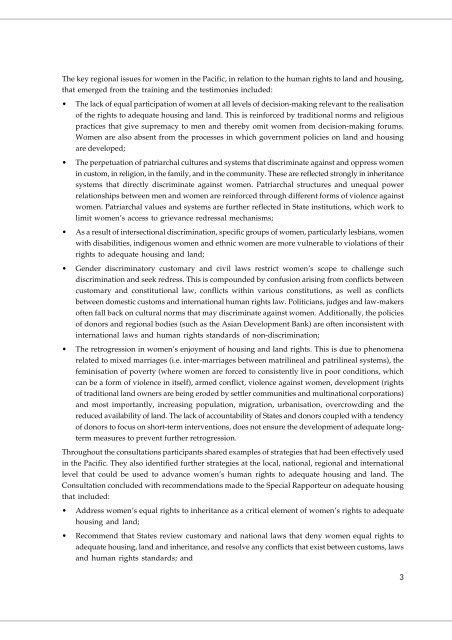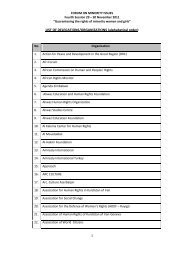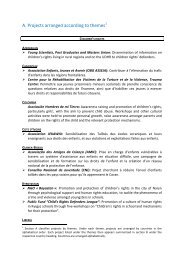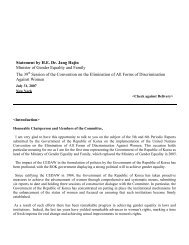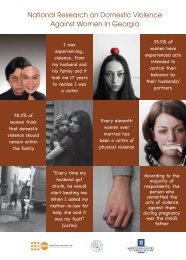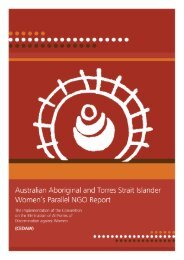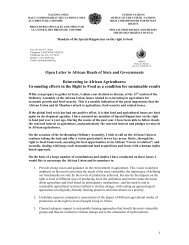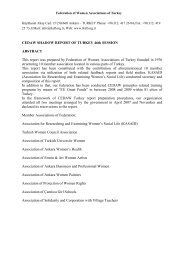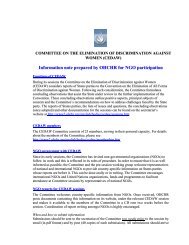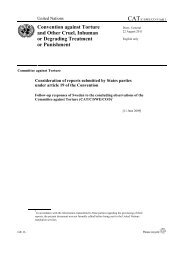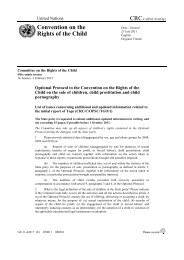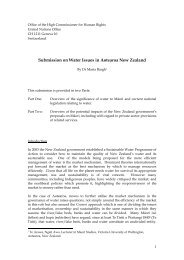Report - Office of the High Commissioner on Human Rights
Report - Office of the High Commissioner on Human Rights
Report - Office of the High Commissioner on Human Rights
- No tags were found...
Create successful ePaper yourself
Turn your PDF publications into a flip-book with our unique Google optimized e-Paper software.
The key regi<strong>on</strong>al issues for women in <str<strong>on</strong>g>the</str<strong>on</strong>g> Pacific, in relati<strong>on</strong> to <str<strong>on</strong>g>the</str<strong>on</strong>g> human rights to land and housing,<br />
that emerged from <str<strong>on</strong>g>the</str<strong>on</strong>g> training and <str<strong>on</strong>g>the</str<strong>on</strong>g> testim<strong>on</strong>ies included:<br />
• The lack <str<strong>on</strong>g>of</str<strong>on</strong>g> equal participati<strong>on</strong> <str<strong>on</strong>g>of</str<strong>on</strong>g> women at all levels <str<strong>on</strong>g>of</str<strong>on</strong>g> decisi<strong>on</strong>-making relevant to <str<strong>on</strong>g>the</str<strong>on</strong>g> realisati<strong>on</strong><br />
<str<strong>on</strong>g>of</str<strong>on</strong>g> <str<strong>on</strong>g>the</str<strong>on</strong>g> rights to adequate housing and land. This is reinforced by traditi<strong>on</strong>al norms and religious<br />
practices that give supremacy to men and <str<strong>on</strong>g>the</str<strong>on</strong>g>reby omit women from decisi<strong>on</strong>-making forums.<br />
Women are also absent from <str<strong>on</strong>g>the</str<strong>on</strong>g> processes in which government policies <strong>on</strong> land and housing<br />
are developed;<br />
• The perpetuati<strong>on</strong> <str<strong>on</strong>g>of</str<strong>on</strong>g> patriarchal cultures and systems that discriminate against and oppress women<br />
in custom, in religi<strong>on</strong>, in <str<strong>on</strong>g>the</str<strong>on</strong>g> family, and in <str<strong>on</strong>g>the</str<strong>on</strong>g> community. These are reflected str<strong>on</strong>gly in inheritance<br />
systems that directly discriminate against women. Patriarchal structures and unequal power<br />
relati<strong>on</strong>ships between men and women are reinforced through different forms <str<strong>on</strong>g>of</str<strong>on</strong>g> violence against<br />
women. Patriarchal values and systems are fur<str<strong>on</strong>g>the</str<strong>on</strong>g>r reflected in State instituti<strong>on</strong>s, which work to<br />
limit women’s access to grievance redressal mechanisms;<br />
• As a result <str<strong>on</strong>g>of</str<strong>on</strong>g> intersecti<strong>on</strong>al discriminati<strong>on</strong>, specific groups <str<strong>on</strong>g>of</str<strong>on</strong>g> women, particularly lesbians, women<br />
with disabilities, indigenous women and ethnic women are more vulnerable to violati<strong>on</strong>s <str<strong>on</strong>g>of</str<strong>on</strong>g> <str<strong>on</strong>g>the</str<strong>on</strong>g>ir<br />
rights to adequate housing and land;<br />
• Gender discriminatory customary and civil laws restrict women’s scope to challenge such<br />
discriminati<strong>on</strong> and seek redress. This is compounded by c<strong>on</strong>fusi<strong>on</strong> arising from c<strong>on</strong>flicts between<br />
customary and c<strong>on</strong>stituti<strong>on</strong>al law, c<strong>on</strong>flicts within various c<strong>on</strong>stituti<strong>on</strong>s, as well as c<strong>on</strong>flicts<br />
between domestic customs and internati<strong>on</strong>al human rights law. Politicians, judges and law-makers<br />
<str<strong>on</strong>g>of</str<strong>on</strong>g>ten fall back <strong>on</strong> cultural norms that may discriminate against women. Additi<strong>on</strong>ally, <str<strong>on</strong>g>the</str<strong>on</strong>g> policies<br />
<str<strong>on</strong>g>of</str<strong>on</strong>g> d<strong>on</strong>ors and regi<strong>on</strong>al bodies (such as <str<strong>on</strong>g>the</str<strong>on</strong>g> Asian Development Bank) are <str<strong>on</strong>g>of</str<strong>on</strong>g>ten inc<strong>on</strong>sistent with<br />
internati<strong>on</strong>al laws and human rights standards <str<strong>on</strong>g>of</str<strong>on</strong>g> n<strong>on</strong>-discriminati<strong>on</strong>;<br />
• The retrogressi<strong>on</strong> in women’s enjoyment <str<strong>on</strong>g>of</str<strong>on</strong>g> housing and land rights. This is due to phenomena<br />
related to mixed marriages (i.e. inter-marriages between matrilineal and patrilineal systems), <str<strong>on</strong>g>the</str<strong>on</strong>g><br />
feminisati<strong>on</strong> <str<strong>on</strong>g>of</str<strong>on</strong>g> poverty (where women are forced to c<strong>on</strong>sistently live in poor c<strong>on</strong>diti<strong>on</strong>s, which<br />
can be a form <str<strong>on</strong>g>of</str<strong>on</strong>g> violence in itself), armed c<strong>on</strong>flict, violence against women, development (rights<br />
<str<strong>on</strong>g>of</str<strong>on</strong>g> traditi<strong>on</strong>al land owners are being eroded by settler communities and multinati<strong>on</strong>al corporati<strong>on</strong>s)<br />
and most importantly, increasing populati<strong>on</strong>, migrati<strong>on</strong>, urbanisati<strong>on</strong>, overcrowding and <str<strong>on</strong>g>the</str<strong>on</strong>g><br />
reduced availability <str<strong>on</strong>g>of</str<strong>on</strong>g> land. The lack <str<strong>on</strong>g>of</str<strong>on</strong>g> accountability <str<strong>on</strong>g>of</str<strong>on</strong>g> States and d<strong>on</strong>ors coupled with a tendency<br />
<str<strong>on</strong>g>of</str<strong>on</strong>g> d<strong>on</strong>ors to focus <strong>on</strong> short-term interventi<strong>on</strong>s, does not ensure <str<strong>on</strong>g>the</str<strong>on</strong>g> development <str<strong>on</strong>g>of</str<strong>on</strong>g> adequate l<strong>on</strong>gterm<br />
measures to prevent fur<str<strong>on</strong>g>the</str<strong>on</strong>g>r retrogressi<strong>on</strong>.<br />
Throughout <str<strong>on</strong>g>the</str<strong>on</strong>g> c<strong>on</strong>sultati<strong>on</strong>s participants shared examples <str<strong>on</strong>g>of</str<strong>on</strong>g> strategies that had been effectively used<br />
in <str<strong>on</strong>g>the</str<strong>on</strong>g> Pacific. They also identified fur<str<strong>on</strong>g>the</str<strong>on</strong>g>r strategies at <str<strong>on</strong>g>the</str<strong>on</strong>g> local, nati<strong>on</strong>al, regi<strong>on</strong>al and internati<strong>on</strong>al<br />
level that could be used to advance women’s human rights to adequate housing and land. The<br />
C<strong>on</strong>sultati<strong>on</strong> c<strong>on</strong>cluded with recommendati<strong>on</strong>s made to <str<strong>on</strong>g>the</str<strong>on</strong>g> Special Rapporteur <strong>on</strong> adequate housing<br />
that included:<br />
• Address women’s equal rights to inheritance as a critical element <str<strong>on</strong>g>of</str<strong>on</strong>g> women’s rights to adequate<br />
housing and land;<br />
• Recommend that States review customary and nati<strong>on</strong>al laws that deny women equal rights to<br />
adequate housing, land and inheritance, and resolve any c<strong>on</strong>flicts that exist between customs, laws<br />
and human rights standards; and<br />
EXECUTIVE SUMMARY 3


